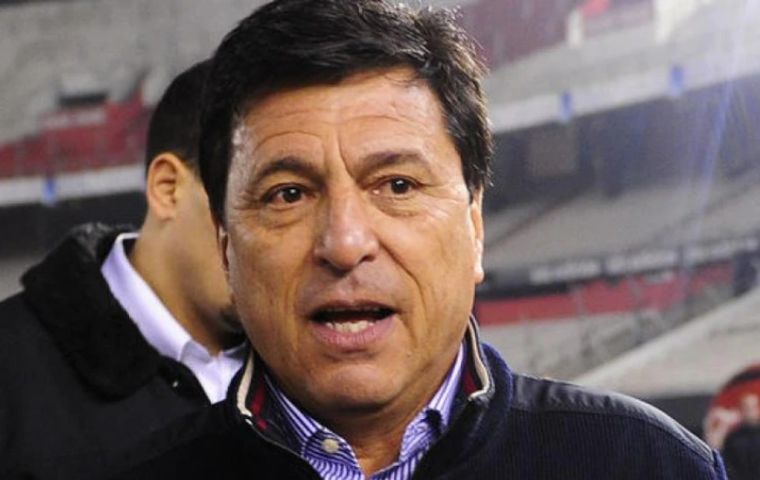MercoPress. South Atlantic News Agency
Passarella has a neurological condition similar to Parkinson's and Alzheimer's
 “The consequences of the blows are only seen when they have been ex-players for years,” Herbella noted
“The consequences of the blows are only seen when they have been ex-players for years,” Herbella noted Daniel Alberto Passarella, who captained Argentina to their first ever World Cup title, on home soil in 1978, has been reported to have a neurodegenerative condition with combined signs and symptoms of Parkinson's and Alzheimer's disease, which keeps him isolated at home most of the time.
Passarella, 69, is also the only player to have won both World Cups, since he was on the 1986 winning roster, although he did not play at all in the Mexico event. His case is but one of many retired athletes who have this type of ailments, which only manifest themselves long after retirement.
According to the sports newspaper Olé, the 69-year-old Passarella “suffers today a process of cognitive deterioration similar to that experienced by his father.” Passarella's inner circle admitted he sometimes forgets things and is unable to manage even his own house.
Besides his participation in the national team both as a player and coach, in Argentina he is most remembered for his spells at River Plate, as a defender, then as coach, and at last as club president. During his tenure, one of the two most important clubs in Argentina together with Boca Juniors was relegated from the top category in 2013 for the first and so far only time in its history.
One of his last public appearances was in December 2020 during the Alejandro Sabella memorial, who had been his playing colleague and assistant both at River Plate and the national squad. Sabella eventually coached Argentina to the 2014 World Cup final in Brazil.
Juan Manuel Herbella, like Passarella a former defender with a less vibrant career in a number of clubs in Argentina and in Latin America, who is also a medical doctor and TV commentator, pointed out that Passarella's case was just the tip of the iceberg among athletes.
Although head collisions in football are commonplace, “there is very little scientific evidence in case studies on the impact of skull microtraumatisms, both from headers and collisions, on the brain health of players,” Herbella explained. “Cases of association between traumatic brain injuries and degenerative diseases have been known in boxers for half a century,” he added.
But “evidence has emerged in other sports such as American football, rugby, ice hockey, and soccer,” he went on.
Herbella also noted that the case of Hilderaldo, the world champion captain with Brazil, was the first in Latin America.
In Europe, English rugby players are suing the federation for injuries of this origin. “How long will it take for soccer players to realize this and make a big collective claim?,” Herbella wondered.
The Argentine expert also cited in an article published 442.perfil.com “an exhaustive study” by Geoff Manley and colleagues (A systematic review of potential long-term effects of sport-related concussion) had concluded that “concussions and repetitive microtrauma are a risk factor for cognitive impairment and mental health problems in some individuals who play sports at a competitive level.”
Herbella also noted Australians created the Australian Sports Brain Bank, a medical research laboratory within the neuropathology department at the Royal Prince Alfred Hospital (RPA) in Sydney, to study the relationship between brain injury, repetitive concussions and chronic traumatic encephalopathy (CTE).
In Herbella's opinion, cases like Passarella's go unnoticed or “are mistaken for an age-related deterioration,” despite the recurrent number of cases. The physician-footballer was also critical of the players' union for not addressing the issue. After all, soccer players have medical insurance up until a few months past their playing years, and “the consequences of the blows are only seen when they have been ex-players for years.”
Last but not least, the former defender quoted the chief medical officer of the soccer players' union worldwide, Dr. Vincent Gouttebarge: “It is essential to improve the recognition and management of concussion in professional soccer, so that the players' health can be protected both in the short and long term.”




Top Comments
Disclaimer & comment rulesCommenting for this story is now closed.
If you have a Facebook account, become a fan and comment on our Facebook Page!